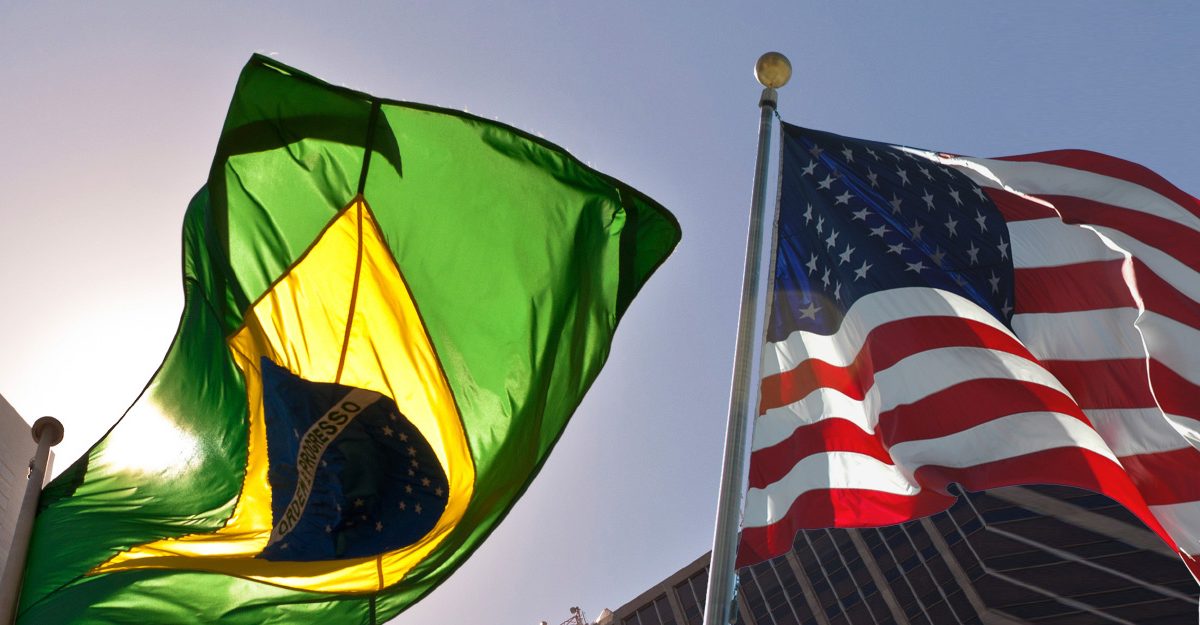RIO DE JANEIRO, BRAZIL – The announced partnership that Jair Bolsonaro and Donald Trump’s governments boast about has not been reflected in the business environment between Brazil and the United States.
Even considering the worldwide trade deceleration triggered by the pandemic – an overall drop of 9.6 percent in Brazilian business with the world – the trade balance between the two countries had a significant drop, suffering a 25 percent cut between January and August this year, compared to the same period last year.

The drop in Brazilian sales to the North American market was even greater, around 32 percent – from US$19.8 billion between January and August 2019 to US$13.4 billion over the same period in 2020, with oil and semi-manufactured products as the main items. The US sold less to Brazil, but the rate of reduction was less acute, 18 percent. The deficit in the trade balance between the two countries closed at over $3 billion negative for Brazil until August, against just over $200 million negative last year.
On the other hand, business with China – a constant victim of criticism by the government and the Bolsonaro family – grew nearly six percent, with the Asian country’s swift rebound after the coronavirus outbreak and Beijing’s sharp demand for agricultural products. The Chinese are Brazil’s largest trading partner, having overtaken the US in 2009, and a key destination for national agribusiness sales.
In addition to China, sales and purchases only increased for the Netherlands, the gateway to the European Union, and Canada, with an overall decline of nine percent in Brazil’s business with the world. The Chinese, frequently criticized by members of the Planalto Palace, are Brazil’s largest trading partner and business between the two countries amounted to around US$69.1 billion (about R$380 billion), with the balance favoring Brazil growing to around US$25.5 billion. The US, considered a priority partner, came second with US$29.8 billion (approximately R$164, 2).
Foreign trade figures with the US are not pleasant for the Itamaraty (Foreign Office), which has been criticized by experts and opponents for its alleged subservience to the Trump administração and for making little profit from this systematic alignment on several issues. Foreign Minister Ernesto Araújo was at the Senate Foreign Relations Committee on Thursday to discuss precisely this issue, after gaining prominence with US Secretary of State Mike Pompeo’s visit to Boa Vista last week, when he visited a reception facility for Venezuelan refugees. The visit was considered by some as part of Pompeo’s politica agenda, which supports Trump’s reelection in November. Bolsonaro has always made it clear that he has a preference for the republican candidate’s reelection.
Diplomats in Brasília on standby
Araújo rebutted this virtually unanimous assessment, saying it made no sense: “There is a great convergence between Republicans and Democrats in the United States about the situation in Venezuela,” the chancellor said of the crisis in the Caribbean country.
In practice, however, Brazil has made more concessions than it has been granted. For instance, it has agreed to increase the quota of ethanol it imports from the United States, it has not complained about the 80 percent drop in steel sales to the Americans, and it has agreed to relinquish the position of president of the Inter-American Development Bank to one of Trump’s allies. Furthermore, Bolsonaro suspended the visa requirement for Americans who want to visit Brazil with no reciprocal gesture from Washington and heard a promise, so far unfulfilled, of support for admission to the Organization for Economic Cooperation and Development (OECD).
In the meeting with the senators, the Brazilian Chancellor said that the partnership with the Americans is not short-term, but should soon bear fruit. According to the data he presented to legislators, there are three agreements under way: one that deals with trade facilitation involving mainly ethanol and sugar, another that will address regulatory convergence and one that provides for anti-corruption measures.
Diplomats from five countries heard by the report are reluctant about the direction of Brazilian foreign policy. They say they have chosen to postpone any talks with the Itamaraty leadership for the US post-election period because they are unsure whether the former customary Brazilian pragmatism or ideology will prevail if Democrat Joe Biden defeats Republican Trump in the election race. “Trump’s defeat or victory will set the course for Itamaraty politics next year,” a European diplomat said.
For his part, Araújo told legislators that he believes the relationship between the two countries will be maintained, regardless of who wins the November election. “All that we are doing with the United States is of lasting interest to both countries, I am sure. A Democratic government would most likely maintain that same focus,” he said.
Source: El País

